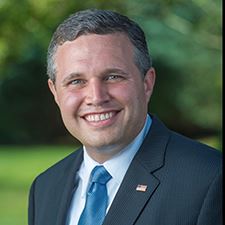One-on-one with Kevin LaValle
Brookhaven Town councilman on redeveloping the Middle Country Road corridor
Part I
Town of Brookhaven Councilman Kevin LaValle (R-Selden) has worked on several major initiatives during his time at Town Hall. In Part I of this two-part interview, LaValle discusses the recent completion of paving projects in Selden, the need for sewers on Middle Country Road, his background in government and the influence of his family on his decision-making.
Could you discuss the recent paving projects completed in Selden and your ongoing work with the Town Highway Department?
Well, that is a major, major issue in my area. I have the smallest geographic area in the whole town. Our districts are broken up by population — about 80,000 people in each district — but my area is a very dense, compact area. What that means is that, obviously, I have a lot of roads, a lot of neighborhoods, a lot of businesses.
One of the things that we did a few years ago was that we made a commitment that we were going to spend $150 million on the town end, which is $15 million a year for the next 10 years, in paving. We made a pledge to the community that that’s what we were going to do to try to help the infrastructure in the town. We’ve been on target with that.
How have you coordinated with Suffolk County to bring sewers into downtown areas within your district?
That is absolutely crucial for the growth of the business community in Centereach and Selden along the Middle Country Road corridor. Hundreds and hundreds of businesses that run up and down this road are unsewered, and even the houses there, every one has a cesspool.
Our big issue on Middle Country Road is that if you look at these lots, they’re all half-acre and acre lots. So what can you build on it? You can’t really get the nice restaurants that other areas have, and that hinders how we can develop and how we can move forward.
We’ve had a lot of success in redeveloping a lot of these lots throughout this corridor, but bringing [sewers] here allows us to take some of these beat up lots and have developers come in and combine them and build something new, whether it’s a two-story office building or a nice restaurant. Because with that sewer capacity, you have the ability to do that.
That’s really why it will be a huge game changer for this area. It will bring good new development down the road. When I was with [the late Suffolk County Legislator] Tom Muratore [R-Ronkonkoma], we kind of started that process to get the sewers going. Now [county Legislator] Nick Caracappa [C-Selden] has jumped into office and it’s really getting supercharged right now.
The county is going to be setting this up, but it gives the town the option — because I deal with rezoning — to be able to start talking to property owners and say, “Hey listen, we have sewers coming down here. If you put this lot together and this lot together, then we could do this.” That’s when you really start getting some exciting opportunities with new businesses and various other things that we want to come into the area.
To follow up, what is your organizational philosophy toward commercial redevelopment?
I think the big key is that when you look up and down the road, we have some small lots that are a quarter-acre or a half-acre — all beat up properties. Right now, anybody coming in and buying them asks, “What can I really do with them?”
Take a look at the property values on Middle Country Road. Some 37,000 cars drive down the portion of Middle Country Road in my area every single day; 37,000 is a massive number — a lot of cars. And great property values. It’s prime real estate, but for developers to come in, you need to have the sewer capacity to be able to build a two-story building on an acre lot, and right now you can’t do that.
If you’re a developer, you have to spend money to buy the property, then money to build it, and then you have to be able to rent it to make your money back. Let’s be very honest about it. That’s what developers do. That’s what businesspeople do, they’re here to make money. So you have to be able to attract them in. By giving them sewers, you will then give them the capacity that their money will go out to redevelop, but it’s also going to come back to them because they’ll be able to bring in new businesses.
We’ve come a long way in the last nine years. The big thing for me as far as developing properties is developing that relationship with the business owners and the property owners, being a straight shooter, telling them, “Hey, this is going to work and this is not going to work.” It’s about not wasting people’s time.
A mentor of mine once asked me, “What’s the most important thing in business?” At the time, I was young — like 24 or 25 — and I said money. He said, “No, not even close.” The most important thing in business is time. If you’re a service provider, it’s the time from when your order is made to when you provide that service to your client. Or if you’re a builder, it’s the time it takes to buy the property, to get through the zoning process and to finish off building. If it takes more time, it’s going to cost you more money.
For me, I like to be a straight shooter with the developers, with the property owners, with the businesspeople, and say if it’s not a realistic concept, don’t string people along, just tell them. If it is a realistic concept, then how can we get you from point A to point B? How can we get you from when you buy the property to when you develop the property?
What is your professional background, and how did you end up at Town Hall?
I started off many years ago, after I graduated college, as chief of staff for Dan Losquadro [R] when he was a [county] legislator many years ago [and is now town highway superintendent]. I worked with Dan for about two years and then I went into the private sector — I owned a title agency for about four years. We have since sold that business and I went into the mortgage business, which I still do to this day.
During that time a bunch of years back, I was asked to come back part time to the [county] Legislature to work for Tom Muratore. He was about a year into the job and was trying to figure out his way a little bit. I decided to come back and I was with Tom for about three years. Then the opportunity to run for Town Council came up.
I never really thought that I would run for office, even though my family had been in office. I didn’t think that was what I wanted to do, but I had a lot of friends and family and people in the community come up to me — because they saw all the work that I was doing with Tom — and they said, “Listen, you do a great job and we really need you to run for the Town Board. We think you could do a great job here.”
I took that run back in 2013 and I was fortunate to get elected. I’ve been a sitting town councilman ever since. It’s been nine years of working on a lot of things within the district and it’s really something that I’ve grown to love and enjoy.
How has your family shaped your approach to public service?
My brother, John [Jay LaValle (R)], was a town councilman and a town supervisor. My cousin, Ken LaValle [R-Port Jefferson], was a state senator for over 40 years. They had very different styles when they were in office. When I was a kid, I watched how they worked.
Ken was very statesmanlike in the way he went about things. John was very aggressive and would take care of business and kind of push things and run around with a lot of energy. I kind of look at both of them and have learned from both styles.
I think there are opportunities to be aggressive when you have to push things and show excitement, like my brother John. I also think there are other opportunities when, like my cousin Ken, you have to sit back, listen, take it all in, really understand the situation, and do your homework to make sure that you know what you’re talking about. I think both of those styles kind of mesh with who I am.
Part II
For over a decade, Town of Brookhaven Councilman Kevin LaValle (R-Selden) has worked on the Selden Park Complex. Now he can see the finish line. In Part II of this two-part interview, the councilman reflects upon the role of parks, open spaces and the mentorship of the late Suffolk County Legislator Tom Muratore (R-Ronkonkoma), under whom LaValle served as legislative aide.
What is the status of the Selden Park Complex?
Now this is something that I’ve been working on since I was aiding Tom Muratore 12 years ago. This is going to be the largest park in the Town of Brookhaven — 24 acres that we’re breaking ground on.
Heritage Park [in Mount Sinai] is a park that’s at the end of County Route 83. When we started talking about this with the community years ago, people said, “That’s something we want. Can we do that?” And now we’re right there.
Phase I was to bring back the two Little League fields near Grace Presbyterian Church. I actually grew up playing baseball on these fields. Grace used to lease them to the Little League, but then Grace was having issues with its insurance, so [the fields] went fallow. We were able to work with the county to buy this property. The deal was cut so that the county would buy the properties and the town would develop them. Veterans [Park] used to be a baseball field. We then came in, redid it, and now it’s a multipurpose field for all the kids. That was Phase II.
We just broke ground recently on the third and final phase, the biggest phase that we have going on here. We’re building two additional baseball fields, a basketball court, pickleball courts, playgrounds, a concession stand, shade shelters throughout, a storage facility for our guys and batting cages. And for the first time in the town’s history — and I always like to be the first guy — I was the first guy to pickleball and now I’m going to be the first guy to roller and deck hockey.
This really comes back to my childhood growing up in Centereach. We had two deck hockey and roller hockey rinks, and I would play deck hockey with my friends. We talked about it and said, “You know what? This is a good idea. Let’s bring this back to the community.” It will be the first time ever that we’re bringing that back.
I kind of refer to this as a generational park. This is where we hope that families that come to the area will walk their children around in strollers around the walking trails. Then when they get a little bit older, they bring the kids over to the playgrounds. Then they get a little bit older and play any kind of sport, whether it’s softball, baseball, lacrosse, soccer … whatever sport they want. Then the kids go off to college, and hopefully they come back to the community where they’re going to be doing the same thing and raising their families using this facility.
What is your office doing to protect open spaces?
Just this past year in the Centereach/Selden community, right on the corner of Old Town Road and County Route 83, there’s a parcel over there that we just made a preserve. That happened to be a town property, and we saw an opportunity to kind of protect it and consider it a nature preserve.
That’s something that I think is really important that we do and that we continue to do as a township. You have to keep in mind that our drinking water is extremely important to what we’re doing — it’s right under our feet. And protecting our lands protects that drinking water. Bringing sewers protects that drinking water, so that’s a critical issue for us.
What do you foresee as the long-term impact of bringing more public funds into the Middle Country area?
It’s one of the reasons I ran for office nine years ago. I grew up in this area, and I can tell you the sentiments of people back then. Generally, we were looking around at all these other communities and watching what they were building — money going here, they’re building a park there, preserving property over here. They said, “This guy’s getting this, they’re getting that, and what are we getting? Are we getting our fair share here?”
That’s something I focus on every day, about how we can rebuild and what money we can bring in. Bringing in new development is one thing — the town doesn’t put money into that. I have to go out and recruit people and work with businesspeople. But making sure our parks are up to par, making sure we’re getting extra money for our roads, these are things you are required to do as a town councilman.
As far as parks go, in my time here, we really have run through all of our parks. We have built a dog park since I’ve been here. We rebuilt Iroquois Avenue Park [in Selden] completely — the walking trail, everything is getting redone.
I grew up less than a mile from the Centereach Pool Complex. When I was a little kid, I would go up and play basketball. When I got elected, the backboards at Centereach Pool were rusted out and the ground was broken up on the basketball courts. It had been just horrendous. Since I’ve been in office, we’ve redone the basketball courts. We’re the first facility to have pickleball, we’ve built sun shelters, we’ve rebuilt the bathrooms and redone the walking trail.
Can you describe the mentorship of Tom Muratore and his influence on you now?
Tom was an unbelievable guy. We were a good team. He was the vice president of the [Suffolk County Police Benevolent Association] before he became a legislator. He was a soft-spoken guy, wasn’t the kind who was flashy or who would always jump to the mic. That wasn’t Tom.
Tom was a guy who liked to work with people and had the biggest heart of anybody I’ve ever known in politics. He just cared for everybody, didn’t need to get credit for things, just wanted to make the community a better place.
He hired me when I was young and aggressive, bouncing off the walls with a lot of energy. And he was a great mentor because he would look at me sometimes and just say, “Kevin, we can pass it today and just push it through, or we can pass it tomorrow with everybody’s consensus.” Or say, “Let’s take our time and get everybody on board.”
I’m an aggressive guy. I like to keep moving and get things going. Tom kind of put the brakes on me. He taught me to take a little extra time to build that extra consensus, making sure everybody’s on board. There were just so many different lessons that I learned from him.
Next year, when we open up [the Selden Park Complex], it will be weird not to have him here. But I know he’s looking down with a big smile on his face, and he’s glad we’re going to finish this out for the community. Something we started together.







